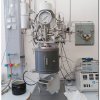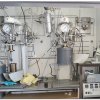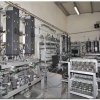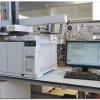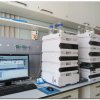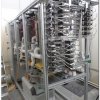Experimental units for evaluation of catalytic activity
At the heart of the infrastructure is a set of various-size dedicated bench-scale flow units allowing investigation of heterogeneous catalysts and catalytic processes in the fixed-bed mode. They can be operated in a wide range of reaction conditions - temperature up to 600 °C, pressure up to 20 MPa and utility gases H2, H2/H2S, N2, air and ethylene from gas pipeline and any other from gas cylinders. The units can be divided into two basic groups - units using sulphur-containing feedstocks (i.e. for hydrotreating and hydrocracking processes and catalysts testing) and units using only sulphur-free feedstocks (i.e. hydrogenation and isomerization processes using typically noble metal catalysts as well as other reactions e.g. condensation reactions, CO conversion reactions, partial oxidation, etc.). The flow units are fully automated and operated by experienced staff 24/7. They can be divided also based on the amount of catalyst they use into small units (5 to 20 g catalyst) and large units (100 to 200 g catalyst). The reactors are built by the company Parr.
In addition, the infrastructure includes also an adsorption unit, a distillation and microreactor unit.
Microreactor unit consists from six independent reactors. Construction material is SS316. The volume of catalyst can be from 1 ml to 10 ml. Operating pressure is in the range 10 to 195 bar, operating temperature is up to 500 °C in down-flow and isothermal mode. Each reactor has own preheater, maximum operating temperature is 350 °C. Each microreactor houses three gas lines: high flow Hydrogen and Nitrogen (max. 100 Nl/h), low flow hydrogen (max. 2 Nl/h) and hydrocarbon (max. 50 Nl/h). The liquid feed section is designed to handle feedstock showing viscosity higher than 100mPas. Flow rate of feed can be from 3 to 150 ml/h. Liquid feed line is designed to handle temperature from 0 to 100 °C. The outlet effluent from the microreactor is routed to the high pressure separator for gas/liquid separation. Separation temperature is regulated from 0 to 100 °C.
Chromatographs (GCs) for analyses of gases and liquids
The infrastructure is equipped also with gas chromatographs ensuring immediate analysis of the products and a feedback for the operation of the experimental units. The chromatographs consist of seven single or dual channel GCs (Agilent) equipped both by packed and capillary columns that can be connected to the experimental units to provide on-line analysis of gaseous effluents from various chemical processes – hydrogenation, hydrodesulphurization, cracking processes, hydrocracking, isomerization, deoxygenation, Fischer-Tropsch process etc. Furthermore, there are six dual channel GCs (Agilent 7890) equipped by capillary columns and various injection modes (split/splitless/on-column) that provide operational at line analysis of a wide range of liquid products. The set of GC instruments is completed by two dedicated GCs for the simulated distillation (SIMDIS) method useful when analysis complex products, e.g. from hydrocracking. Moreover, the infrastructure for detailed product identification is described below.


